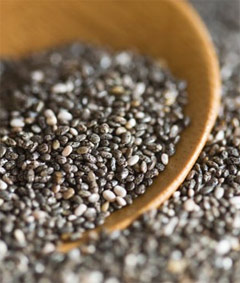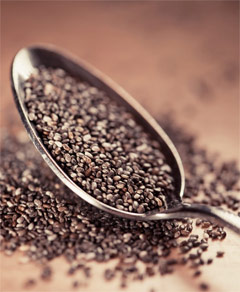|
|
Chia Seed: Counting Health Benefits
 Salvia
hispanica, commonly known as chia, is a species of flowering plant in the mint
family. It is an annual herb growing
up to 1 m (3.3 ft) tall, with opposite leaves that are 4�8 cm (1.6�3.1 in) long
and 3�5 cm (1.2�2.0 in) wide. Its flowers are purple or white and are produced
in numerous clusters in a spike at the end of each stem. Salvia
hispanica, commonly known as chia, is a species of flowering plant in the mint
family. It is an annual herb growing
up to 1 m (3.3 ft) tall, with opposite leaves that are 4�8 cm (1.6�3.1 in) long
and 3�5 cm (1.2�2.0 in) wide. Its flowers are purple or white and are produced
in numerous clusters in a spike at the end of each stem.
This little seed �
which comes in either white or a dark brown and black colour � has a huge nutritional
profile and benefit.
Nutrition Information for Chia Seeds
In addition to their high-fiber content, chia seeds are a good source of
omega-3 fatty acids, plus a few vitamins and
minerals. Here are the nutrition highlights for 1 ounce of chia seeds:
-
Calories - 138
-
Fiber - 9.8 grams
-
Total Fat - 8.71 grams
-
Omega-3 Fatty Acids (Alpha Linolenic Acid) - 5.1 grams
-
Monounsaturated Fatty Acids - 0.66 grams
-
Saturated Fatty Acids - 0.94 grams
-
Calcium - 179 milligrams
-
Magnesium - 95 milligrams
-
Iron - 2.19 milligrams
-
Zinc - 1.30 milligrams
-
Niacin - 2.5 milligrams
-
Folate - 14 micrograms
-
Vitamin A - 15 International Units
|
-
Diabetes Regulation: The
gelatinous coating chia seeds develop when exposed to liquids-can help
prevent blood
sugar spikes. They have
been shown to decrease blood pressure and c-reactive protein (a sign of
inflammation) in type 2 diabetics.
-
High in omega-3: Packed
with omega-3 fatty acids, chia seed contain nearly five grams in a
one-ounce serving. These fats are
important for brain health.
-
Rich in calcium for bone health: A
serving of chia seeds has 18 per cent of the recommended daily intake
for calcium, putting you on the way to maintainingbone and
oral health, and preventing osteoporosis.
-
Good protein, minus the cholesterol: One
28-gram serving of these super seeds has 4.4 grams of protein, nearly 10
per cent of the daily value, without cholesterol.
-
High in anti-oxidant: Chia
seeds are rich in antioxidants and help protect the body from free
radicals, aging and
cancer. The high antioxidant profile also helps them have a long shelf
life. They last almost two years without refrigeration. The antioxidant
activity of chia seeds is higher than any whole food, evenblueberries.
-
 More Minerals in a spoonful: Two tablespoons of chia seeds
contain 35 percent for phosphorus, 24 percent for magnesium and about
50 percent for manganese. These nutrients help you prevent hypertension
and maintain a healthy weight,
and are important for energy metabolism and a part of DNA synthesis. More Minerals in a spoonful: Two tablespoons of chia seeds
contain 35 percent for phosphorus, 24 percent for magnesium and about
50 percent for manganese. These nutrients help you prevent hypertension
and maintain a healthy weight,
and are important for energy metabolism and a part of DNA synthesis.
-
Drop food craving & help in weight management: They
reduce food
cravings by preventing
some of the food that you eat from getting absorbed into your system.
This blockage of calorie absorption makes them a great diet manager.
Tryptophan, an amino acid found in chia seeds helps regulate appetite,
sleep and improve mood. Besides they absorb 10 times their weight in
water, forming a bulky gel, keeping you full for long.
-
Gluten-free: Chia
seeds contain no gluten or grains. Therefore, all of the nutritional
benefits of chia seeds can be obtained on a gluten-free diet.
-
Keep away belly fat: Chia
seeds have stabilizing effect on blood sugar thereby help in fighting
insulin resistance which can be tied to an increase in belly
fat.This type of resistance can also be harmful for your overall
health.
-
Easy to digest: They
are easier to digest than flax
seeds, and don't need to be ground up.
How to Eat Chia Seeds
Chia seeds can be eaten raw or prepared in a number of dishes. Sprinkle ground
or whole chia seeds on cereal, rice, yogurt or vegetables. In Mexico, a dish
called chia fresco is made by soaking chia seeds in fruit juice or water. Chia
seeds are very absorbent and develop a gelatinous texture when soaked in water
making it easy to mix them into cooked cereal or other dishes.
The seeds are not the only important part of the chia plant; the sprouts are
also edible. Try adding them to salads, sandwiches and other dishes.
Caution:
If you have food allergies (especially to sesame or mustard seeds) or are on
high blood pressure medications or blood thinners, you should ask your health
care provider before adding chia to your diet.
Dated 29 July 2013
|
|
|
|
|









